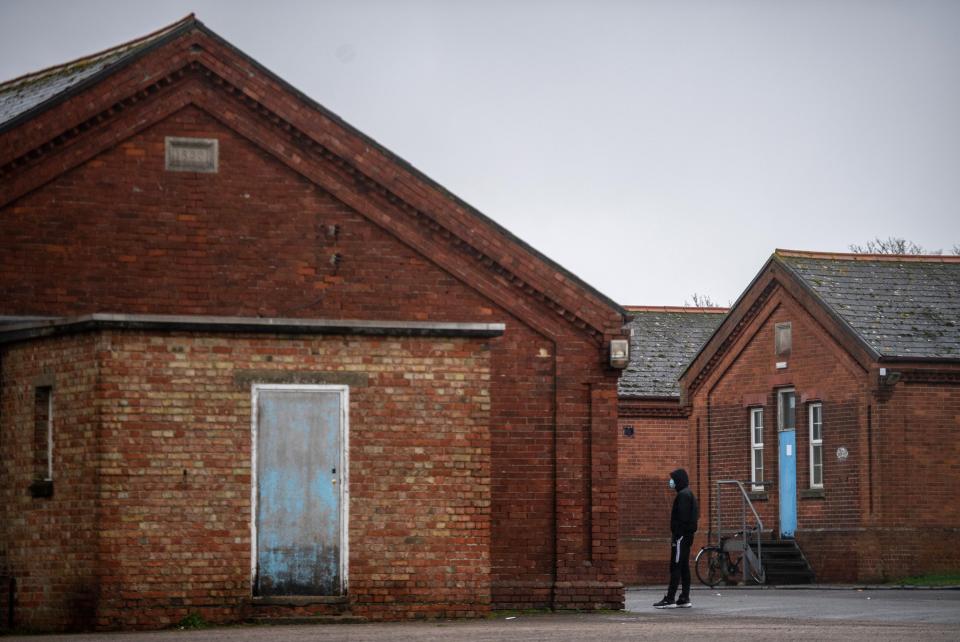High Court to decide whether housing asylum seekers in barracks is unlawful

Six asylum seekers and their lawyers argue the conditions they lived in at Napier Barracks in
Kent were so poor they amount to being unlawful
(Getty Images)" />
The High Court is to consider this week whether the Home Office’s decision to house asylum seekers in military barracks breaches human rights law.
Six asylum seekers were granted permission by the court in February to bring the challenge on the grounds that the accommodation conditions in Napier Barracks in Kent were so poor they amount to being unlawful.
It comes as a cross-party group of MPs prepare to launch an inquiry into the Home Office’s use of military barracks to accommodate asylum seekers, amid concerns that such sites amount to “quasi-detention”.
The Ministry of Defence site was repurposed into asylum accommodation in September and around 400 individuals were subsequently moved in.
Following a major Covid outbreak at the camp in January, which saw nearly 200 people infected, residents were gradually moved out until it was fully emptied on 2 April.
However, the Home Office has decided to continue using the site. Around 70 asylum seekers were moved there last Friday and more are due to be transferred “in due course”, according to the department.
Lawyers have raised alarm over the fact that ministers are pushing ahead with plans to continue to use the site for asylum accommodation despite the ongoing litigation around the legality of doing so.
The court hearing, which opens on Wednesday, will see Mr Justice Linden consider whether the conditions at the site violate the right of those seeking asylum in the UK to a basic standard of living and humane treatment.
He will also consider whether asylum seekers were unlawfully detained in the camp during the Covid outbreak due to a curfew and instructions not to go out at certain times, with a padlock and security guard at the gate.
Sue Willman, solicitor of Deighton Pierce Glynn, one of the law firms bringing the legal case this week, said: “Asylum seeker clients living at Napier all winter said they felt unheard and forgotten about. This week’s trial is a chance to hear about what they experienced.
“We hope the judge will conclude that the conditions in the barracks were unlawful because they violate the right of anyone seeking asylum in the UK to a basic standard of living and humane treatment.”
Lara ten Caten, a lawyer at Liberty, which is intervening in the case, said Napier Barracks was “overcrowded, unhygienic, and has already proved to put people at risk of a coronavirus outbreak”, adding: “This is a clear breach of people’s fundamental right to respect for human dignity.”
It comes after a joint report by the immigration and prison inspectorates found in March that support on the site was “inadequate” and that a coronavirus outbreak was “inevitable”. Public Health England meanwhile warned in September that the conditions were “not suitable”.
It emerged earlier this month that there were no plans to reduce the number of asylum seekers per dormitory at the barracks, in spite of the coronavirus outbreak and the fact that NHS officials have warned that social distancing in such conditions is “impossible”.
Separately, the all-party parliamentary group (APPG) on immigration detention is preparing to launch an inquiry into the Home Office’s use of “large-scale, institutional” sites such as military barracks to accommodate asylum seekers.
The cross-party group plans to assess the suitability of such sites and hopes its findings can inform discussions in Parliament around the department’s new immigration plans.
“Given the physical and psychological harm so many asylum seekers suffered by being placed at Napier barracks, it is unconscionable and frankly frightening that the Home Office is doing it all over again,” said a spokesperson for Medical Justice, which supports the APPG.
Read More
UK Covid-19 vaccinations: Latest figures
Queen returns to royal duties following Prince Philip’s death
SpaceX satellite ‘came within 60m of crash with another in orbit’

 Yahoo Movies
Yahoo Movies 